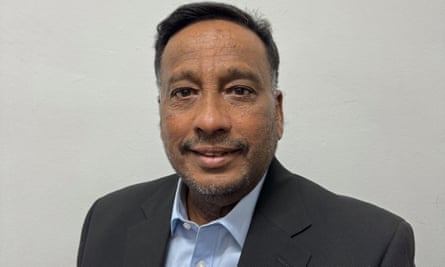Ten years on, Jiang Hui still hopes he will one day find the answer to what happened when his mother disappeared in 2014.
“My mother was a very normal person. She came from a working-class family. She was very resilient, persistent,” says Jiang, 50, from Beijing. His mother, Jiang Cuiyun, was a 72-year-old retired picture editor and had just been on a holiday in Malaysia. She was one of 153 Chinese citizens onboard flight MH370.
Jiang now tries to embody those tenacious qualities of his mother in his decade-long search for answers. His quest for closure has seen him sell his house and quit his job as an IT manager to campaign for the victims full-time. He now relies on his savings. He has travelled the world, including to Madagascar, where he found a piece of possible debris in 2016.
 View image in fullscreen
View image in fullscreen
In Malaysia, Grace Nathan thinks of her mother, Anne Daisy, during significant life events such as her wedding and the birth of her sons, and still speaks of her in the present tense.
“My children resemble her; I see a lot of similarities,” says the 35-year-old from Kuala Lumpur. “They are both very jovial and I think that’s from her.”
Nathan says she has come to terms with the fact that she may never see her mother again, but when it comes to the emotional side of things, she says she has simply not been able to bridge that gap.
‘It took me 10 years to get this hearing started’
In a court in Beijing, Jiang and the families of more than 40 other Chinese passengers are suing the airline and related companies, including German insurer Allianz, Boeing and Rolls-Royce. The first trial, at Chaoyang people’s court, concluded on 6 December last year after only 10 days of hearings. No date has been given for a verdict.
“I am really disappointed in the Chinese legal system,” Jiang says. “The legal nature of this case is not that complicated. I can’t comprehend at all why it would take so long –more than a decade.”
Some families want compensation, ranging from 10m-80m yuan ($1.4m-$11.2m). Some, like Jiang, simply want a fund restarted that would offer a reward for new information. “The search could very soon have tremendous progress. The bounty could provide critical momentum.”
But despite his steadfast belief that more of MH370 can be found, Jiang is “not very optimistic” about the lawsuits. Similar efforts in Malaysia and the US have failed, in part because of disagreements about accountability and jurisdiction. In 2018, judge Ketanji Brown Jackson in the US dismissed a lawsuit from relatives on the grounds that the disappearance was “at its core a Malaysian tragedy”.
“It already took me 10 years to get this hearing started,” Jiang says. “It really reflects that the courts are not sufficient in their determination. It is mistreatment in terms of justice.”
Grace Nathan in Malaysia remains resolute in her quest for answers and justice. She emphasises how international cooperation – 14 nationalities were represented onboard – and corporate responsibility can help fund further searches.
 View image in fullscreen
View image in fullscreen
“Malaysia has never come out to say it is a budget issue,” she says. “But even if it is, that is really one of the easiest obstacles to overcome because there were so many nationalities onboard the plane, China being the world’s second-largest economy.”
On Sunday, prime minister Anwar Ibrahim reiterated Malaysia’s position that it was willing to reopen an investigation if there was compelling new evidence. Transport minister Anthony Loke said he was ready to meet the US marine robotics company Ocean Infinity to discuss a new search after it submitted a proposal to the government.
Nathan hopes this is a step in the right direction. “This is an optimistic move... No search can guarantee the finding of the plane, [but] if we don’t try we will never know.”
Jacquita Gonzales, whose husband Patrick Gomes was the flight supervisor on MH370, has long been frustrated by the lack of search activity, even if only to prevent another tragedy. She is now awaiting the results of any meeting with Ocean Infinity. “We are happy that the announcement was made. It’s a step in the right direction for them not to forget about it or keep silent,” she says.
However, Fuad Sharuji, the crisis director for Malaysian Airlines when MH370 was lost, is more cautious. “I’m very happy to note that Ocean Infinity has graciously offered to search for MH370 at ‘no-find, no-fee’ basis. However, I’m rather sceptical that the new search area would result in a positive find..”
 View image in fullscreen
View image in fullscreen
‘The Malaysian government has delayed justice’
The victims’ families in China have organised themselves into a rare collective able to express their grief and anger publicly. That is because most of their ire is directed at Malaysian, rather than Chinese, authorities.
“I am disappointed in the Chinese justice system, but even more angry with the Malaysian justice system,” says Jiang, who also accuses Malaysia of actively impeding the relatives’ quest for justice. “The Malaysian government has delayed justice,” he says, referring to the fact that the government allowed the airline to be restructured in a way that frustrated the ability of families to sue the company.
In 2015, Malaysia Airlines was nationalised following months of financial difficulties over MH370 plus another disaster, the shooting down of flight MH17 over Ukraine. A restructuring process followed, in which the legal liabilities arising from the loss of MH370 were not passed on to the new entity, Malaysia Airlines Berhad.
Dr Ghouse Mohd Noor, a friend of MH370 pilot Captain Zaharie Ahmad Shah, is critical of the Malaysian government’s handling of the investigation, accusing it of self-interest, and has called for accountability.
 View image in fullscreen
View image in fullscreen
“The government is only working for what they think is best for their political purposes … with their decisions influenced by the expected outcome that would benefit the ruling government,” Noor says, in reference to claims of early efforts to use the tragedy to smear Anwar, who was opposition leader at the time.
Jiang and the other relatives have suffered post-traumatic stress disorder and other mental health problems. “It’s not only the original incident. The reluctance and the nonchalant attitude of the Malaysian government and the other companies, it’s really causing a secondary level of damage,” he says.
 View image in fullscreen
View image in fullscreen
The families of more than 100 of the Chinese passengers have accepted compensation from the airline, with settlements reportedly ranging from 2.5m to 3m yuan ($349,000–$418,000).
But Jiang has never considered accepting the offer. The settlement specifies that there is no duty to continue the search, he says, and “that is not in my best interest”.
Like many of the families, Jiang has faced financial difficulties. He estimates he’s spent 30,000-40,000 yuan investigating MH370. Other families have struggled to pay medical bills, he says.
Although initially supportive of the victims’ families, the Chinese government has been cautious about the potential diplomatic fallout. Some relatives feel Beijing should put more pressure on Kuala Lumpur to continue the search. When the court proceedings in Beijing began in November, China’s foreign ministry spokesperson said the government was paying “high attention” to the lawsuits, but declined to comment further.
Meanwhile, the families continue to cope as best they can, with their minds sometimes filling in the gaps where the mystery endures.
For Jacquita Gonzales and the family of her missing husband, Patrick Gomes, there is little respite, even at night. “An aunt that brought him up said she had a dream he was drenched from head to toe and he said to her, ‘I’m sorry but I tried my best.’
“Knowing the kind of person Patrick is, he would have done his best to help everyone onboard.”
Additional research by Tau Yang and Tzu Wei Liu
∎